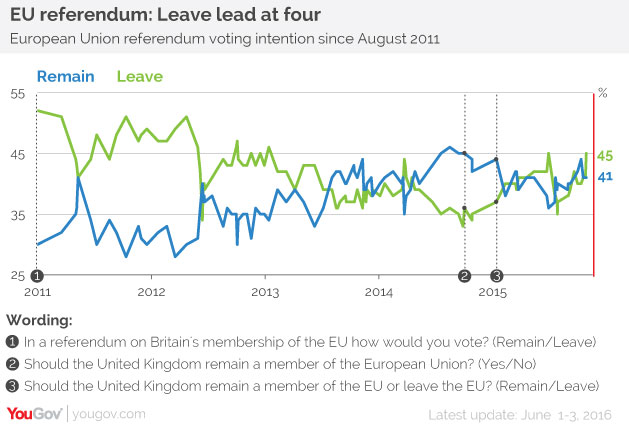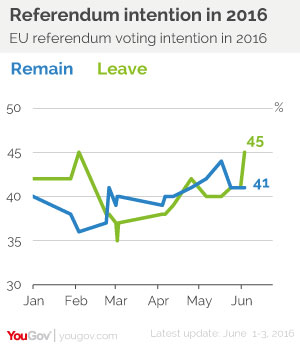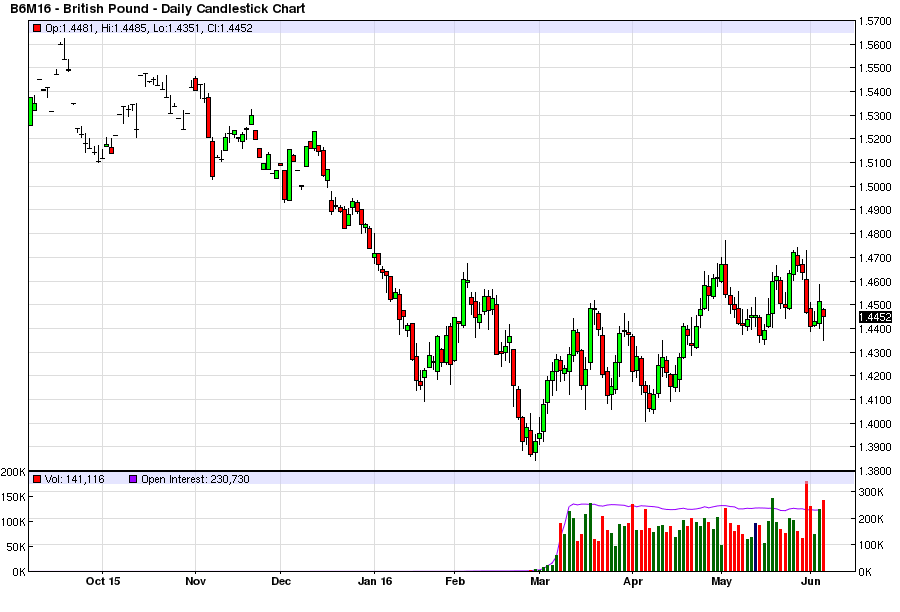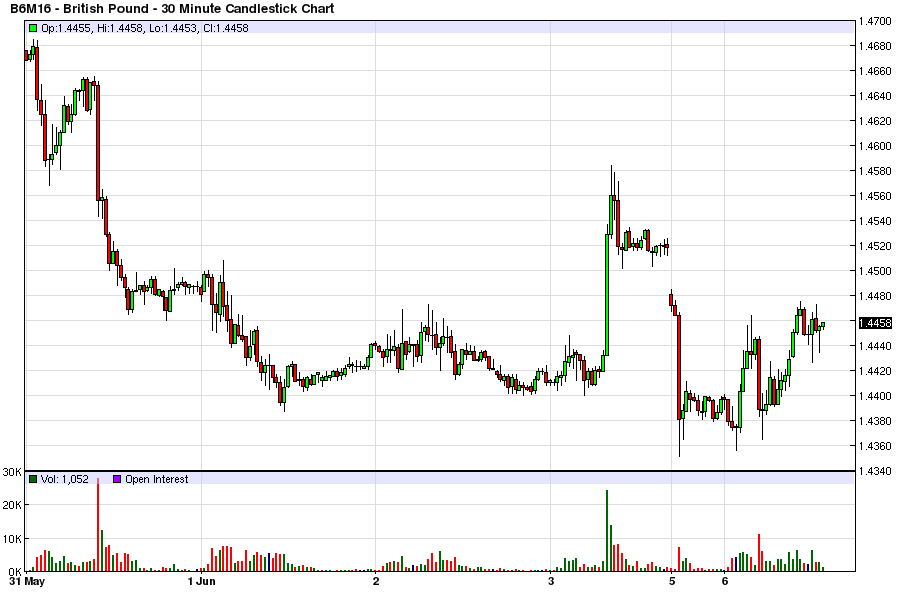Pro-BREXIT campaigners Boris Johnson (ex-mayor of London) and Michael Gove (UK Secretary of Justice) are in a good mood. Photo credit: Paul Grover / REX Polls Show Growing Support for a Break with the EU In the UK as elsewhere, the political elites may have underestimated the strength of the trend change in social mood across Europe. The most recent “You-Gov” and ICM pools show a widening lead in favor of a UK exit from the EU as the day of the vote comes closer. To be sure, such polls can easily turn out to be wrong – especially as the percentage of undecided voters is still fairly large. Still, the current lead of the “leave” campaign is the greatest since 2013: EU referendum: Leave lead at four A long term chart of BREXIT poll results (note that the wording of the referendum question has been altered a few times) EU referendum: Leave lead at four – click to enlarge. In 2012 and 2013 the “leave” campaign’s lead was far larger as the euro area’s debt crisis was still fresh in everybody’s mind. It is a good bet that David Cameron chose the 2017 date for the actual referendum because he thought the effects of this particular problem would have dissipated by then. They have indeed, but not completely. People were e.g.
Topics:
Pater Tenebrarum considers the following as important: Boris Johnson, British Pound, Debt and the Fallacies of Paper Money, EU referendum, Featured, Michael Gove, newsletter, On Politics
This could be interesting, too:
Nachrichten Ticker - www.finanzen.ch writes Die Performance der Kryptowährungen in KW 9: Das hat sich bei Bitcoin, Ether & Co. getan
Nachrichten Ticker - www.finanzen.ch writes Wer verbirgt sich hinter der Ethereum-Technologie?
Martin Hartmann writes Eine Analyse nach den Lehren von Milton Friedman
Marc Chandler writes March 2025 Monthly

Pro-BREXIT campaigners Boris Johnson (ex-mayor of London) and Michael Gove (UK Secretary of Justice) are in a good mood. Photo credit: Paul Grover / REX
Polls Show Growing Support for a Break with the EU
In the UK as elsewhere, the political elites may have underestimated the strength of the trend change in social mood across Europe. The most recent “You-Gov” and ICM pools show a widening lead in favor of a UK exit from the EU as the day of the vote comes closer.
To be sure, such polls can easily turn out to be wrong – especially as the percentage of undecided voters is still fairly large. Still, the current lead of the “leave” campaign is the greatest since 2013:
EU referendum: Leave lead at fourA long term chart of BREXIT poll results (note that the wording of the referendum question has been altered a few times) |
In 2012 and 2013 the “leave” campaign’s lead was far larger as the euro area’s debt crisis was still fresh in everybody’s mind. It is a good bet that David Cameron chose the 2017 date for the actual referendum because he thought the effects of this particular problem would have dissipated by then.
They have indeed, but not completely. People were e.g. recently once again reminded of the costly extend-and-pretend exercise that is required to mask the insolvency of Greece. Meanwhile, in France unions and their supporters have embarked on a seemingly semi-permanent nation-wide riot in order to force the government to abandon an already extremely watered-down attempt to reform the country’s utterly insane labor laws.
In its latest coup making waves, the eurocracy has decided it would be a good time to attack free speech under the guise of an allegedly urgently needed suppression of so-called “hate speech” (what precisely constitutes “hate speech” is presumably to be determined by EU bureaucrats).
These events may have revived support for the Brexit campaign, which was flagging earlier in the year in the wake of the establishment embarking on a pro “remain” propaganda full-court press.
Referendum intention in 2016A close up of BREXIT voter intentions in 2016. Initially the pro-remain “fear propaganda” onslaught seemed to work, but that has changed rather dramatically of late. |
Reuters summarizes:
The campaign for Britain to leave the European Union has taken a 4-5 percentage point lead ahead of a June 23 referendum, according to online polls by ICM and YouGov, sending sterling toward three-week lows against the U.S. dollar.
The swing toward “Out” with less than three weeks to go comes as both sides step up their campaigning to try to win over the large number of still undecided voters with warnings over the economy and immigration.
The ICM poll of 1,741 people taken June 3-5 showed 48 percent would vote to leave, up from 47 percent a week earlier, while 43 percent would opt to stay, down 1 percentage point from a week earlier.
The YouGov poll of 3,495 people on June 1-3 showed 45 percent would opt to leave the EU, up from 40 percent in a comparable poll a month earlier, while 41 percent would opt to stay, down from 42 percent.
British pound, June futures contract, dailyLooking at the pound, we can see that it actually bottomed (for now) in late February already: |
June pound over the past week, 30 minute candlesA close-up shows the increase in volatility over the past week. We would actually argue that if the “leave” campaign wins and there is another knee-jerk sell-off in the pound, it will very likely represent a great short term buying opportunity: |
“Fear Campaign” Loses Bite
There is an interesting article on the “You-Gov” web site itself, that suggests that the “fear campaign” that has worked so well in keeping Scotland from voting in favor of independence may not be working as well as was expected in the case of the Brexit referendum:
In the past week there has been much talk of how the Leave campaign its focus back to immigration. Some have argued that they have lost the argument on the economy and are dropping back to their comfort zone. The inference of all this was that Leave is a campaign in freefall, much like the tail end of Labor’s general election campaign in 2015.
However, as we enter the final few weeks before the EU referendum vote, the Leave campaign appears to be surprisingly resilient and may even be gaining some of that valuable political commodity, momentum. A closer analysis of some of our internal data gives a clue as to why this is.
Put bluntly, it seems as though some of the tactics from the so-called “project fear” playbook that was deemed to have done so well in the closing days of the Scottish Independence referendum are not cutting through as they did in the final weeks of the 2014 vote. This was shown in last week’s Sky News interview with David Cameron where many members of the public said the Prime Minister was “scaremongering.”
(emphasis added)
The article goes on to argue that while the Scots were successfully intimidated by the suggestion that their personal financial situation would suffer in the event of Scottish independence, voters don’t seem to believe this idea to be credible in the Brexit case. It goes on to dispense advice on how the “remain” campaign could still hope to squeak by (namely by focusing on creating precisely this type of fear).
It is also mentioned that the “economic case” is the only issue uniting the pro EU camp, in other words, the one case which has apparently failed to gain traction. And while the article implicitly suggests that the economic case is somehow clear-cut, it clearly is not. In fact, if that is what unites the “remain” campaign, it very urgently needs a new issue to rally around (it is too late for that though).
Let us rather say: from a UK perspective, leaving would very likely be economically beneficial. A Brexit would primarily be bad for the rest of the EU, or rather, its citizens. Those would lose the main advocate for subsidiarity and economic freedom in the EU. The erection of a socialist super-state would come a decisive step closer after a UK exit.
The article highlights that the pro-”leave” camp has a far more powerful argument, namely precisely the issue of control and self-determination. It is rightly feared that more and more power is shifting to the faceless Brussels nomenklatura, a hodge-podge of unaccountable and vastly overpaid political has-beens and busy-body bureaucrats.
The Economic Argument
The EU was once seen as a fairly pro-business and pro free market organization – at least relatively speaking, this is to say relative to the national policies that were in force before it came into being. It cannot be denied that the organization has initially taken steps toward liberalization (in terms of trade, capital flows, movement of people). Today it is however perceived as an agency that regulates everything to death, which it has indeed become. Maybe that was always the goal though.
After all, one has to wonder why a centralized agency should be needed in order to introduce liberal economic policies. It seems actually more likely that liberalization could be successfully achieved in a decentralized system with a great many compering territories, as citizens could relatively easily vote with their feet. There are few things better able to rein in overzealous politicians.
In fact, the earliest predecessor of the EU (the European Coal and Steel Community) was essentially a cartelization device aimed at coordinating government activities in what were then largely nationalized industries. The so-called “harmonization” of taxation and the suppression of subsidiarity (a.k.a. “regulatory competition”) have always been official goals of the EU.
However, because the Treaty of Rome also included the commitment to economic liberalization, there were initially advantages to be had for several countries, especially those that had been crushed under the yoke of socialism for many years. Funny enough, this was actually the case with the UK when it joined the EU in the 1970s.
Alas, assorted “European institutions” that were established by the EU as well (i.e., its various pan-European bureaucracies) have done what such bureaucratic central planning agencies always do: they have grown like weeds and have expanded their power enormously. Today the difference between the Eurocracy and Gosplan seems largely cosmetic.
Britain can of course have free trade even if it no longer takes orders from Brussels. Said orders range from how many liters of water may exit a shower-head per minute, to how many Watts a vacuum cleaner may have to whether a toaster may exist at all – many of these rules are plain ridiculous and frankly, anti-civilization (see “Saving the Planet One Slice at a Time” for some color on this).
There is after all EFTA (the European Free Trade Area) and trade agreements can be struck on a bilateral basis as well. The EU would only shoot itself into the foot if it were to try to “punish” the UK for waving good-bye to Brussels by erecting barriers to trade and capital movement.
Readers who haven’t seen it yet should definitely take the time to watch the movie embedded below (called “Brexit – The Movie”), which discusses these points in detail, inter alia the historical developments mentioned above. It shows how the UK initially benefited from being “forced” to liberalize its economy by becoming a member of the EU and how this effect been completely reversed in the meantime, as EU over-regulation kills off one UK industry after another.
Brexit – The Movie
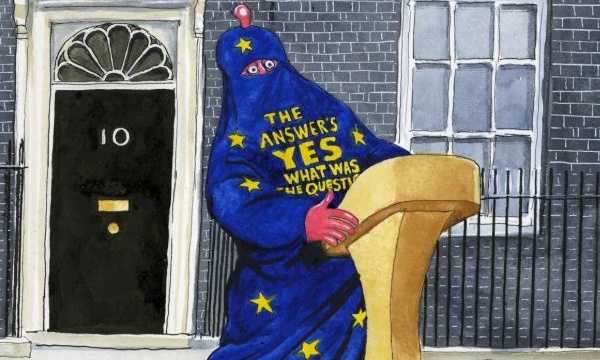
Cameron tries to persuade the electorate to vote against “Brexit”. This time, his efforts may not suffice. Cartoon by Steve Bell
Conclusion
When the social mood turns sour, harmony and togetherness are “out”. Larger groups tend to splinter into smaller groups, society tends to become more insular. In the particular case of Brexit, there is also the fact that the EU has become a vast and costly Moloch incessantly spitting out mountains of regulations, with its unaccountable central planning agencies taking over more and more tasks. What once used to be a force for liberalization (at least for some countries) has become an engine of restriction.
Charts by: You-Gov.uk, BarChart
Previous post
